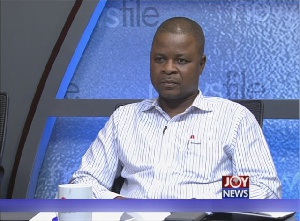The Attorney General’s department has said it does not have enough evidence to prosecute the disgraced former President of the Ghana Football Association, Kwasi Nyantakyi.
This comes after the adjudicatory chamber of the FIFA Ethics Committee banned Mr Nyantakyi for life from all football activities at both national and international level (administrative, sports or any other).
Speaking to Starr News’ Parliamentary Correspondent, Ibrahim Alhassan, a Deputy Attorney General and Minister of Justice, Joseph Dindiok Kpemka, said the verdict by the football governing body wasn’t unexpected.
“It was always expected that the evidence that was put before FIFA will lead to this, looking at their rules and regulations governing their operations,” he said adding “I had no doubt in my mind that whatever conclusions they came to were expected and so when it was released it was only a conclusion of what we have long held.”
“But I heard that and some people even posted something trying to indict my boss that she said there was no evidence to prosecute Nyantakyi. That’s a statement of fact that she made because there is a difference between a civil inquisition in law and a criminal prosecution,” he stated.
Commenting on suggestions from a section of the public that the ban was a bit harsh given the fact that the allegations levelled against Mr Nyantakyi were just mere intentions Mr Kpemka said: “If you attempt to commit an offence and you are convicted you suffer the punishment of having committed the same offence.
“The most important thing we should be looking at is the substance of the matter. Yes. You may say the life ban is too harsh but remember also that he has the right to appeal and when he appeals and they listen to him and find that he is making a very strong case they may review the punishment.”
The decision to ban Mr Nyantakyi was taken upon the request of the chairperson of the investigatory chamber of the Ethics Committee carrying out the formal investigation proceedings into him. It comes after an earlier 90-day provisional ban for breaching the football governing body’s code of ethics.
Mr Nyantakyi came under heavy public bashing in June following an investigative masterpiece by ace investigative journalist Anas Aremeyaw Anas that captured him on videos negotiating a deal with businessmen and accepting a bribe of $65,000 to help establish an oil business in his native country.
He was also filmed while negotiating how to create a fake agency to pocket 20 per cent of a supposed five-year sponsorship deal for the Ghana Premier League worth $15 million and bragging to some supposed investors about how he could help them to induce officials of the ruling government including President Akufo-Addo with money to secure contracts in the country. He would have been $3.7 million richer if everything had gone as planned.
The National Democratic Congress (NDC) said in a stament that FIFA’s decision to ban Mr Nyantakyi after months of rigorous investigations raises serious questions about the involvement of President Akufo-Addo in the bribery scandal; and also brings to the fore, once again, the need for the Criminal Investigations Department (CID) to inform Ghanaians about the status of their investigations into this scandal which has tarnished the image of Ghanaians and Ghana.
In his reaction, Mr Kpemka said the criticism from the NDC was “borne out of crass ignorance,” explaining that the verdict by FIFA was the result of a civil inquisition.
“So they found at the end of it conflict of interest was established etcetera and then unethical behaviour. They found all those things contrary to rules of FIFA. That was why they exacted this punishment. That was not a criminal trial.”
General News of Wednesday, 31 October 2018
Source: starrfmonline.com

















